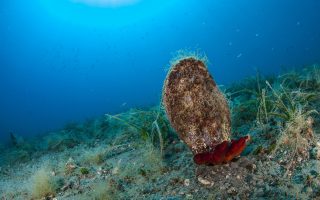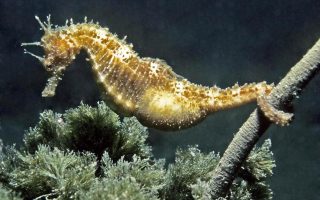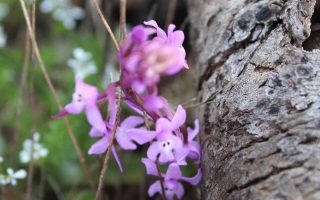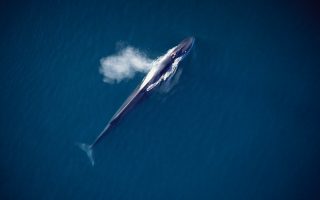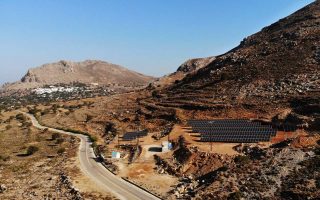Jane Goodall spreads the word of conservation
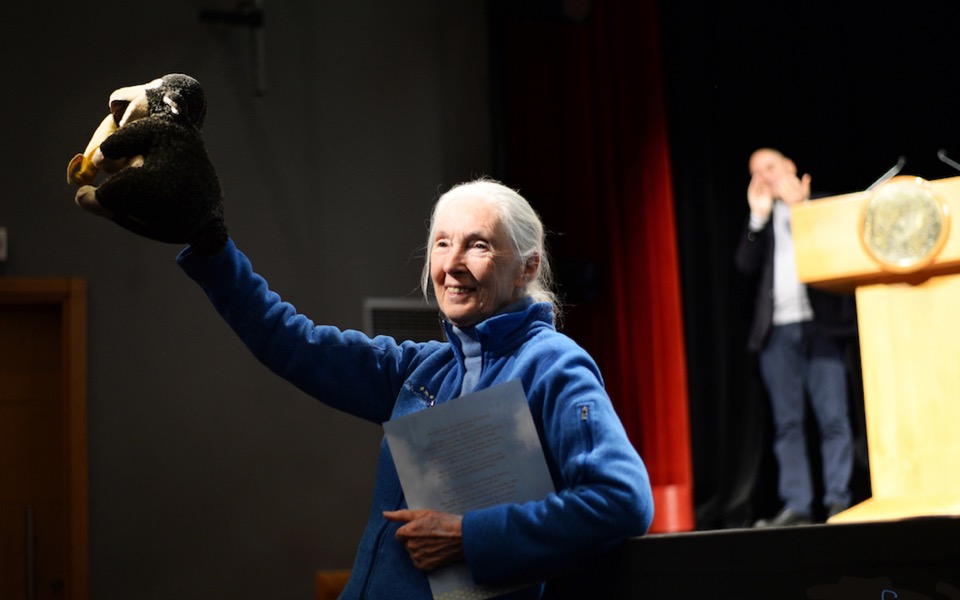
People must “choose wisely” what kind of impact they have on the planet, Dr Jane Goodall tells Kathimerini in an interview about the work being done by the Greek branch of her Roots & Shoots initiative and ahead of her visit to three Greek cities on December 9-11 to spread the message of conservation.
The British scientist, who is known for her work with chimpanzees in Africa and is also a United Nations Messenger of Peace, said she is looking forward to “spreading a message of hope in Greece, raising awareness about our work, and urging people to help us in our efforts to make this a better world for all.”
She has also expressed concern about animal abuse in Greece, as Dr Anna Katogyriti, the head of Roots & Shoots Greece, told Kathimerini.
Katogyriti said the last email Goodall sent her referred to the mistreatment of donkeys on the island of Santorini, an issue which the two scientists are planning to address.
This will be your second time speaking in Greece. What are you hoping to see and achieve with this visit compared to your last one?
During my last visit, led by Anna Katogyriti, we decided to initiate, with a couple of wonderful volunteers, the Jane Goodall Institute’s Roots & Shoots program for young people of all ages, from kindergarten to university (which is now active in some 80 countries). Everyone except Anna was new to me. This time I shall be meeting with people who became my friends, as well as new people. And I shall be able to visit some of the projects that have been launched, and hear first-hand about others.
In 2016, I was only in Athens. This year I shall be visiting Thessaloniki and Iraklio for the first time. On Crete we shall be celebrating a new and exciting collaboration with the Natural History Museum of Crete after discussions with [its director] Dr Moisis Mylonas. And I am very happy to be experiencing the beautiful city of Thessaloniki. I look forward to spreading a message of hope in Greece, raising awareness about our work, and urging people to help us in our efforts to make this a better world for all.
During your last visit, you had said that your main mission would be to try to grow Roots & Shoots in schools and universities. Has this goal been achieved? Could you give us some examples regarding the work that has been done in some Greek schools up to now?
I know that multiple Roots & Shoots projects have been initiated throughout the country, including but not limited to Athens, Thessaloniki, Patra, Crete and Karpathos, to name a few. In addition, I know that the core team in Greece has grown and we now have trusted and passionate volunteers in Athens and Thessaloniki who have helped in facilitating seminars for educators and have participated in various events to promote chimpanzee conservation and the R&S program.
I hear also that during 2018, JGI Greece successfully launched scholarships for Roots & Shoots projects – meaning that five teams received mini-grants. Hopefully, in the future, it will be possible to provide more financial help to students who have thought of valuable projects for people, animals and the environment.
All of these accomplishments have been made possible through the tireless and dedicated work of our Greek volunteers and one paid employee, as well as through support from wonderful partnerships that started in 2016 with nonprofit organization SciCo (Science and Communication) and the British Council – both of which have supported the office in Greece since its beginning – as well as from recent new partnerships with other respected organizations and institutions, such as the National Geographic team in Greece, the Natural History Museum of Crete and the University of Crete.
You always inspire us with your wonderful lectures, and we’re looking forward to your next one. The title is “Reasons for Hope.” Could you give us some insight into the things that can make our society more hopeful, not only in Greece but globally?
We are going through dark times almost everywhere these days, with the political swing to the far-right causing major problems both for the environment and for people. Greece has not only had to cope with economic recession making life extremely difficult for many people, but it has also had to cope with a flow of immigrants fleeing war and climate change. Many scientists are maintaining that, because of climate change, poverty, the unsustainable lifestyles that so many of us have, and the growing human population, we are already on a downward trajectory with no hope of recovery. But I believe that we have a window of time – perhaps only a small one – when, if we get together, we can at least start to heal some of the harm we have inflicted on Mother Earth. I have reasons for hope.
Firstly the energy and commitment of young people when they know the problems, when we listen to their voices, when we empower them to take action. Roots & Shoots is all about rolling up sleeves and taking action, and everywhere I go there are young people eager to tell Dr Jane what they have been doing to make the world a better place.
Secondly, the one way in which we differ most of all from other animals is the explosive development of the human brain (how bizarre that the most intellectual creature to ever walk planet Earth should be destroying its only home – there seems to be a disconnect between our clever brains and our hearts, love and compassion). But science is beginning to come up with new technologies that will help us live in better harmony with nature, and we are beginning to find ways that we, as individuals, can leave lighter environmental footsteps.
Thirdly, nature is amazingly resilient. I have seen so many places that have been utterly despoiled by human activity but which, given time, have once again become beautiful as nature reasserted itself. And there are many animal species that have been rescued from the very brink of extinction and given another chance.
Fourthly, there is the indomitable human spirit. People who tackle the seemingly impossible and refuse to give up. Icons like Nelson Mandela, who was released from prison after 17 years of hard physical labor in a limestone quarry and, with his amazing ability to forgive, was able, with F.W. de Klerk, to lead South Africa out of the evil regime of apartheid. There are people who rise above devastating physical disabilities and inspire those around them. And those who manage to rebuild their lives after a whole variety of economic and social problems.
Every one of us has that indomitable spirit, though in some it seems trapped within. We must release it in these dark times. We must realize that every one of us makes some impact on the planet, every day. Let us choose what kind of impact we make, let us choose wisely.
Goodall’s speech, titled “Reasons for Hope,” will be delivered in English with simultaneous interpretation into Greek. The venues are the Olympion Theater in Thessaloniki (Dec 9) at 5.30 p.m. (doors open at 5 p.m.), the Pallas Theater in Athens (Dec 10) at 6 p.m. (doors open at 5.15 p.m.) and the Cultural Center of Iraklio (Dec 11) at 6.30 p.m. (doors open at 5.30 p.m.). Admission is free.
